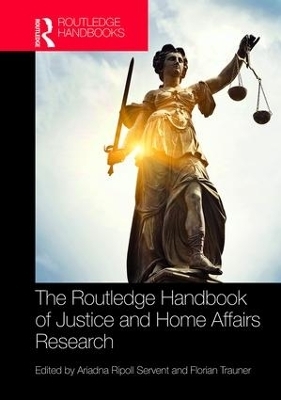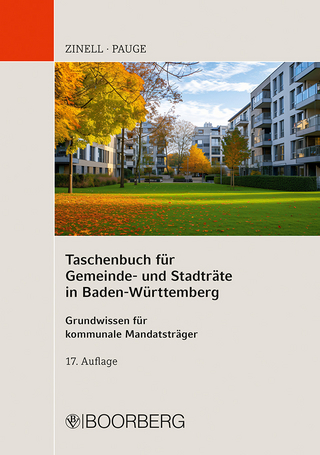
The Routledge Handbook of Justice and Home Affairs Research
Routledge (Verlag)
978-1-138-18375-9 (ISBN)
Justice and Home Affairs is one of the fastest expanding areas of research in European Studies. The European response to security concerns such as terrorism, organised crime networks, and drug trafficking as well as to the challenge of managing migration flows are salient topics of interest to an increasing number of scholars of all disciplines, the media and general public. This handbook takes stock of policy development and academic research in relation to justice and home affairs and analyses the field in an unprecedented thematic depth.
The book comprehensively investigates the field from the perspective of the three dimensions central to European integration: the sectoral (policies), the horizontal (states, regions) and the vertical (institutions, decision-making) dimensions. It also discusses the most important theoretical approaches used in this research area and provides the reader with a state of the art picture of the field.
By adopting such a comprehensive and broad-based approach, the handbook is uniquely positioned to be an important referent for scholars, practitioners and students interested in the area of justice, home affairs and European politics.
Ariadna Ripoll Servent is Professor of Political Science and European Integration at the University of Bamberg, Germany. Florian Trauner is Research Professor at the Institute for European Studies and the Department of Political Science of the Vrije Universiteit Brussel, Belgium, and a Visiting Professor at the College of Europe.
PART I: Introduction 1. Justice and Home Affairs Research – Introducing the State of the Art and Avenues for Further Research [Florian Trauner and Ariadna Ripoll Servent] PART II: Theories of Justice and Home Affairs 2. The Governance of Internal Security – Beyond Functionalism and the Finality of Integration? [Raphael Bossong and Hendrik Hegemann] 3. Securitization: Turning an Approach into a Framework for Research on EU Justice and Home Affairs [Christian Kaunert and Ikrom Yakubov] 4. Public Policy Approaches and the Study of European Union Justice and Home Affairs [Mark Rhinard] PART III: Analyzing Justice and Home Affairs Policies (The Sectoral Dimension) 5. Asylum and Refugee Protection: EU Policies in Crisis [Petra Bendel and Ariadna Ripoll Servent] 6. The Irregular Immigration Policy Conundrum: Problematizing ‘Effectiveness’ as a Frame for EU Criminalization and Expulsion Policies [Sergio Carrera and Jennifer Allsopp] 7. Informalizing EU Readmission Policy [Jean-Pierre Cassarino] 8. Border Management: The Schengen Regime in Times of Turmoil [Ruben Zaiotti] 9. EU Visa Policy: Decision-Making Dynamics and Effects on Migratory Processes [Mathias Czaika and Florian Trauner] 10. EU Labor Immigration Policy: From Silence to Salience [Georg Menz] 11. Organized Crime: Balancing National Sensitivities with Global Necessities [Daniela Irrera] 12. Cyber Crime as a Fragmented Policy Field in the Context of the Area of Freedom, Security and Justice [Helena Carrapico and Benjamin Farrand] 13. EU Counter-Terrorism: Glass Half-Full or Half-Empty [Oldrich Bures] 14. Data Protection Policies in EU Justice and Home Affairs – A Multilayered and Yet Unexplored Territory for Legal Research [Paul de Hert and Vagelis Papakonstantinou] 15. EU Home Affairs and Technology: How to Make Sense of Information and Data Processing [Julien Jeandesboz] 16. EU Criminal Law: An Expanding Field for Research, With Some Unchartered Territories [Anne Weyembergh and Chloé Brière] 17. Judicial Cooperation in Civil Matters – Coming of Age? [Eva Storskrubb and Anna Wallerman] 18. Family Reunification and Migrant Integration Policies in the EU: Dynamics of Inclusion and Exclusion [Saskia Bonjour] PART IV: Justice and Home Affairs Inside and Outside Europe (The Horizontal Dimension) 19. Europe's Core Member States: Intended and Unintended Consequences of Strong Policy-Shaping Traditions [Andreas Ette] 20. Southern Europe: Twenty-Five Years of Immigration Control on the Waterfront [Claudia Finotelli] 21. Differentiated Integration and the Brexit-Process in EU Justice and Home Affairs [Steve Peers] 22. Central and Eastern Europe: The EU’s Struggle for Rule of Law Pre- and Post-Accession [Ramona Coman] 23. The Western Balkans: Decreasing EU External Leverage Meets Increasing Domestic Reform Needs [Florian Trauner and Zoran Nechev] 24. Justice and Home Affairs in EU-Turkey Relations: Mutual Interests but Much Distrust [Alexander Bürgin] 25. The Eastern Partnership Countries and Russia: A Migration-Driven Cooperation Agenda with the European Union [Oleg Korneev and Peter Van Elsuwege] 26. The Southern Mediterranean: A Testing Ground and a Litmus Test for EU JHA Policies and Research [Sarah Wolff and Patryk Pawlak] 27. Africa-EU Relations on Organized Crime: Between Securitization and Fragmentation [Judith Vorrath and Verena Zoppei] 28. The Evolution of Transatlantic Legal Integration: Truly, Madly, Deeply? EU – US Justice and Home Affairs [Elaine Fahey] 29. EU Cooperation in Justice and Home Affairs with Australia and Canada: New Ties that Bind? [Agnieszka Weinar] 30. The EU and Latin America: A Real Security and Development Nexus or A Superficial One? [Arantza Gómez Arana] 31. The EU-ASEAN Relationship: Cooperation on Non-Traditional Security Threats between Discourse and Practice [Angela Pennisi di Floristella] PART V: EU Institutions and Decision-Making Dynamics (The Vertical Dimension) 32. The European Parliament in jJstice and Home Affairs: Becoming More Realistic at the Expense of Human Rights? [Ariadna Ripoll Servent] 33. The European Court of Justice as a Game Changer: Fiduciary Obligations in the Area of Freedom, Security and Justice [Ester Herlin-Karnell] 34. The European Commission in Justice and Home Affairs: Pushing Hard to be a Motor of Integration [Natascha Zaun] 35. The Council and European Council in EU Justice and Home Affairs Politics [Christof Roos] 36. The Role of National Parliaments in the Area of Freedom, Security and Justice: High Normative Expectations, Low Empirical Results [Angela Tacea] 37. The EU’s Agencies: Ever More Important for the Governance of the Area of Freedom, Security and Justice [Juan Santos Vara] 38. NGOs Go To Brussels: Challenges and Opportunities for Research and Practice in AFSJ [Emek M. Uçarer] 39. International Organizations and the Area of Freedom, Security and Justice [Claudio Matera]
| Erscheinungsdatum | 29.03.2018 |
|---|---|
| Reihe/Serie | Routledge International Handbooks |
| Zusatzinfo | 12 Tables, black and white; 3 Line drawings, black and white; 3 Illustrations, black and white |
| Verlagsort | London |
| Sprache | englisch |
| Maße | 174 x 246 mm |
| Gewicht | 997 g |
| Themenwelt | Recht / Steuern ► EU / Internationales Recht |
| Sozialwissenschaften ► Politik / Verwaltung ► Staat / Verwaltung | |
| Sozialwissenschaften ► Soziologie | |
| Wirtschaft ► Volkswirtschaftslehre ► Wirtschaftspolitik | |
| ISBN-10 | 1-138-18375-X / 113818375X |
| ISBN-13 | 978-1-138-18375-9 / 9781138183759 |
| Zustand | Neuware |
| Haben Sie eine Frage zum Produkt? |
aus dem Bereich


